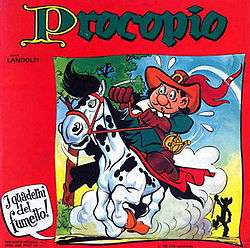
Don Procopio
Don Procopio is a two-act opera buffa by Georges Bizet with an Italian libretto completed in 1859, and first performed in 1906.
Background
Bizet spent three years in Italy, 1857 to 1860, as winner of the Prix de Rome. Looking for inspiration for a work to send home, he found the subject for his opera buffa in a second-hand bookstall in Rome, writing home that the piece was "an Italian farce in the manner of Don Pasquale" by Carlo Cambiaggio (1798-1880). The words were a reduced version of I pretendenti delusi (1811) by Giuseppe Mosca (1772-1839).
Composition was sporadic over the winter of 1858-59; Bizet confessed that he was still trying to find his voice, although he intentionally aimed at an Italian style for this piece. The report from the Prix de Rome judges noted advances, but a later report signed by Ambroise Thomas criticised Bizet for sending an 'opéra bouffe' as his first envoi and suggested he divert his attention away from this toward sacred music (although Bizet failed to submit a religious envoi of any sort from Rome).

Procopio
Procopio (c. 1841- ?), also known as Red-Handed Dick and Red Dick was one of the best-known bandits in California history. His nickname was reportedly given due either to his red hair, or his violent nature and bloodthirstiness. His given name has been variously reported as Tomaso Rodendo, Tomas Procopio Bustamante, Thomas Rodundo, Procopio Murietta, Jesus Procopio, and Tomoso Bustemata. In 1872, the San Francisco Chronicle called him "one of the most fearless and daring desperadoes that has ever figured in the criminal annals of our state." He was twice convicted of cattle theft and twice served time in San Quentin prison, but was never convicted of any of the murders he was alleged to have committed. Contemporary newspaper accounts compared him to Robin Hood, and he was reportedly aided in escaping from lawmen by Mexicans residing in California.
Youth
Procopio (disambiguation)
Procopio is a Mexican bandit.
Procopio may also refer to:
See also

Procopio (comics)
Procopio is the title character of an eponymous Italian comic strip series created by Lino Landolfi.
The comic started in 1951 in the comics magazine Il Vittorioso, where it was published until the close of the magazine in the late sixties.
Procopio debuted as a squire of a medieval knight. The author was later able to make it a polyvalent character, who plays many different roles, with the artifice of a modern Procopio, which tells of the adventures of his ancestors (all called Procopio and all with the same characteristics and traits).
In a 1958, in an Italian survey conducted by RAI TV, it resulted as the most popular character of the children's literature and comics.
In 1966, Procopio was protagonist of a series of vinyl records titled Le fiabe di mago Procopio; the same year he was subject of a novel, Procopio di Terracupa, written by the same Landolfi.
Procopio also appeared in a short-living series of B&W animated shorts.
References
Podcasts:

